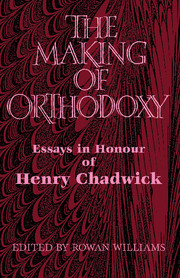Book contents
- Frontmatter
- Contents
- Preface
- List of abbreviations
- Bibliography of Henry Chadwick
- Does it make sense to speak of pre-Nicene orthodoxy?
- ‘And I have other sheep’ – John 10:16
- Reason and the rule of faith in the second century ad
- Adam in Origen
- Panegyric, history and hagiography in Eusebius' Life of Constantine
- Matthew 28:19, Eusebius, and the lex orandi
- The achievement of orthodoxy in the fourth century ad
- Eunomius: hair-splitting dialectician or defender of the accessibility of salvation?
- Some sources used in the De Trinitate ascribed to Didymus the Blind
- The rhetorical schools and their influence on patristic exegesis
- Pelagianism in the East
- The legacy of Pelagius: orthodoxy, heresy and conciliation
- Augustine and millenarianism
- Divine simplicity as a problem for orthodoxy
- The origins of monasticism
- Artistic idiom and doctrinal development
- Index of modern names
- Index of ancient and medieval names
- Index of sources
The achievement of orthodoxy in the fourth century ad
Published online by Cambridge University Press: 08 October 2009
- Frontmatter
- Contents
- Preface
- List of abbreviations
- Bibliography of Henry Chadwick
- Does it make sense to speak of pre-Nicene orthodoxy?
- ‘And I have other sheep’ – John 10:16
- Reason and the rule of faith in the second century ad
- Adam in Origen
- Panegyric, history and hagiography in Eusebius' Life of Constantine
- Matthew 28:19, Eusebius, and the lex orandi
- The achievement of orthodoxy in the fourth century ad
- Eunomius: hair-splitting dialectician or defender of the accessibility of salvation?
- Some sources used in the De Trinitate ascribed to Didymus the Blind
- The rhetorical schools and their influence on patristic exegesis
- Pelagianism in the East
- The legacy of Pelagius: orthodoxy, heresy and conciliation
- Augustine and millenarianism
- Divine simplicity as a problem for orthodoxy
- The origins of monasticism
- Artistic idiom and doctrinal development
- Index of modern names
- Index of ancient and medieval names
- Index of sources
Summary
The great majority of theological students in the English-speaking world can only read English. If such a one were to determine to investigate the critical development concerning Christian doctrine which took place in the fourth century of the Christian era, he would find himself very badly served. Recent books covering the whole story of the last stages of the formation of the doctrine of the Trinity are scarce, but they exist, and they are not in English. Much the best is Manlio Simonetti's La Crisi Ariana nel Quarto Secolo. There is also E. Boularand's L'Hérésie d'Arius et la foi de Nicée, which has some good points but generally is not satisfactory, if only because when Arius propounded his views they were not then formally heretical. In English the last full-scale book written on the whole Arian controversy was that of H. M. Gwatkin, Studies of Arianism, published in 1882. Twenty-seven years later he published the short Arian Controversy but in a note prefixed to it he says that this work is ‘largely, though not entirely, an abridgement’ of the earlier book. That book was a fine one in its day, but it is now almost completely out of date. The only other works that could be said to be comprehensive in approaching the subject are G. L. Prestige's God in Patristic Thought and J. N. D. Kelly's Early Christian Doctrines.
- Type
- Chapter
- Information
- The Making of OrthodoxyEssays in Honour of Henry Chadwick, pp. 142 - 156Publisher: Cambridge University PressPrint publication year: 1989
- 8
- Cited by

